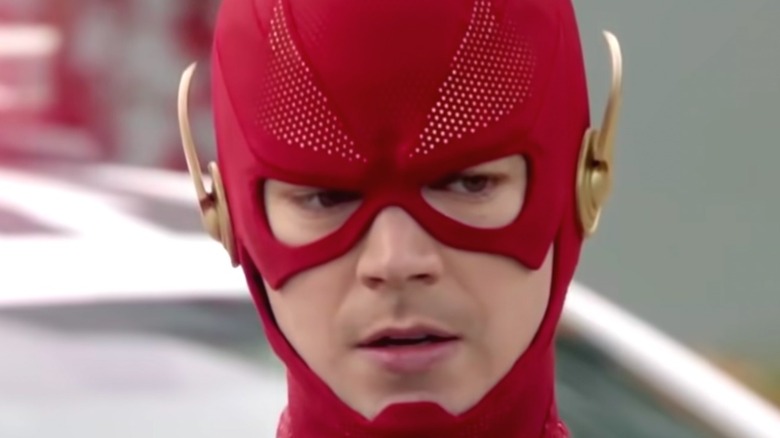The Worst Episode In The Flash Season 8
"The Flash" is one of the original "Arrowverse" shows, the second of the seven series, preceded only by the cornerstone, "Arrow." Because of that, it is the series with the highest episode count, surpassing even that of its aforementioned predecessor. Of course, like with all series, some episodes of "The Flash" are destined to resonate more than others.
After Season 7 leaves off after a literal clone war featuring many versions of the villainous speedster, Godspeed (Karan Oberoi), Season 8 picks up six months later when an alien psychic, Despero (Tony Curran), dreams of the end of the world. He believes Barry Allen (Grant Gustin) is the cause of the world's end and insists that Barry must die to save everyone else. In a five-episode arc titled "Armageddon," a quasi-crossover event sees Team Flash interact with Jefferson Pierce (Cress Williams from "Black Lightning"), Ray Palmer (Brandon Routh from "Arrow" and "Legends of Tomorrow"), Alex Danvers (Chyler Leigh from "Supergirl"), Ryan Wilder (Javicia Leslie from "Batwoman"), and Mia Queen (Katherine McNamara from "Arrow").
Notably, there is one episode of the season that is a clear step below the rest. Here is the worst episode of "The Flash" Season 8.
Episode 6 didn't resonate with fans
While Season 8 has garnered a score of 78% on Rotten Tomatoes, the IMDb scores show that Season 8, Episode 6 ("Impulsive Excessive Disorder") has the lowest rating of any episode of the season thus far. With an average score of 6.4, this episode is the first after "Armageddon" to drop below the 7.0 mark. The episode sees Nora (Jessica Parker Kennedy) and Bart (Jordan Fisher), the children of Barry and Iris (Candice Patton), return to the future to find that they have unintentionally changed their world. Similar to "Flashpoint" earlier in the series, changing the future by altering the past seems to run in the blood of the Allen family.
Alex Gherzo of Geeks + Gamers gave readers a scathing review of the installment. Gherzo wrote, "'Impulsive Excessive Disorder' gives you a hint of what's to come from the title — a cutesy, poorly-punned way to use Bart and Nora's superhero alter egos." He goes on to reveal the real problem with the episode isn't the overused time-travel-changing-the-present trope but the actors/characters themselves. "They're cartoons come to life, ripped out of a children's show and put on prime time for an audience that outgrew them when they graduated to numbered school grades," Gherzo said. "They're difficult enough to tolerate in supporting roles, but an entire hour with them at the helm is excruciating."
Other fans, however, disagreed with Gherzo and found more problems with the confusing and ever-changing nature of time travel within the plot itself.
The time travel got tricky
Time travel is a tricky thing. While there are dozens of examples of time travel working quite well in film and television, the rules tend to change whenever the plot requires it. "Impulsive Excessive Disorder" leaned on the Allen family once again changing the past and impacting the future, and it confused some fans, just as it did before.
When Barry saved his mother in Season 2, it impacted all events that followed, changing the timeline from that moment on. However, in this episode, Bart and Nora's actions appear to change events going all the way back to 2013. U/Quirky28 took to Reddit asking for an explanation of the inconsistency. "How did the timeline change in 2013 because I am sure Bart and Nora didn't run that far back, so how did they change time that far back?" One answer the Redditor got back was from u/Sparkyboom41, who wrote, "Timeline changes are like a ripple in water; it changes in all directions." Another answer from u/MrMattBlack reminded other Reddit users that Nora theorized it was due to too many people using the cosmic treadmill when it was intended to be used for only one speedster.
However, the most simple explanation came from u/GeniusGamer012, who simply offered, "Cuz storytelling." Understandably, this writer appeared to be under the impression that loose time travel rules become an easy way for writers to create different storylines out of whole cloth. While it is convenient for writers, it would seem that some viewers found the storytelling device less convenient and more troublesome.


